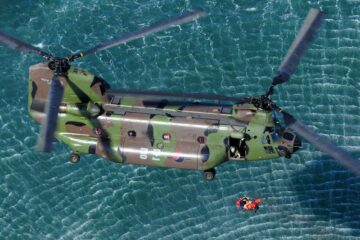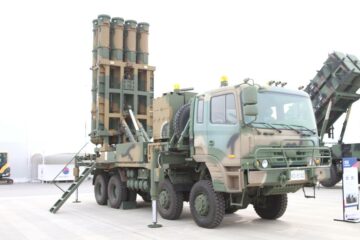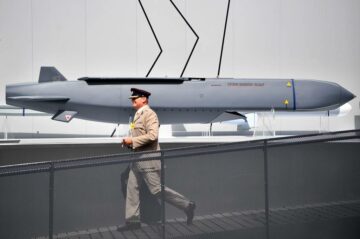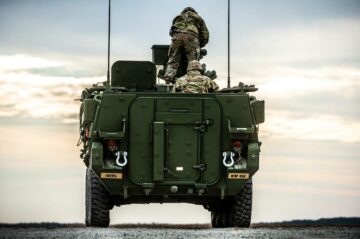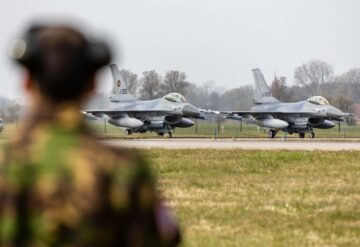
WELLINGTON, New Zealand — New Zealand’s new defense minister has a lot on her plate.
The government appointed Judith Collins to the role in October. She’s also the attorney general; the minister for the Government Communications Security Bureau; the minister in charge of digitizing the government; the minister of the Security Intelligence Service; the minister of science, innovation and technology; and the minister of space.
The New Zealand Defence Force’s briefing to the new minister noted the country faces a “challenging strategic environment” not seen for decades, adding that climate change is “of increasing concern.”
While the briefing explained the military is energized by newly acquired equipment, it also cautioned personnel could feel overwhelmed, given they are charged with maintaining the existing inventory while adopting more materiel.
Furthermore, the force has been experiencing retention and recruitment issues. While deployments are “a key motivator for our people,” the diminishing number of qualified and experienced people called upon to deploy is problematic, the briefing noted. “Although recruitment of new personnel continues, unlike civilian staff, uniformed personnel cannot be recruited from the general labor market, as their skills take years to acquire and that training occurs inside the force.”
Defense News put these concerns and more to the minister in a Feb. 8 interview, which was edited for length and clarity.
The previous government released a defense policy and strategy document in August 2023. What do you think of it?
The defense strategy released last year reflected the changing strategic environment and the need to update New Zealand’s policy settings to a more proactive and deliberate approach to security and defense. That geopolitical tension has, if anything, increased since its release.
When will the next defense whitepaper arrive?
Work is underway on a Defence Capability Plan, which will signal the government’s future investment intentions for defense.
What are your priorities for defense and the three armed services?
Retention, interoperability, innovation and international partnerships are my priorities for defense. This includes giving our personnel more opportunities to do what they signed up for and looking at how we can do things differently.
We must take every opportunity to engage with our international partners so we can further our national interests and ensure the New Zealand perspective is heard. We must also listen so we can contribute meaningfully, and be open to new opportunities where they align with our interests.
To what do you attribute the shortage of recruits and the high attrition in the New Zealand Defence Force?
There are several drivers behind the high attrition rates at NZDF, including remuneration, a strong labor market and highly skilled defense personnel being in demand. The NZDF is working on a number of initiatives to address attrition issues. As of late December 2023, the overall regular force’s attrition rate — across all three services — was 11.9%, down from 15.6% 10 months earlier.
In mid-2023, Air Marshal Kevin Short, the chief of the NZDF, told Defense News that the war in Ukraine has emphasized the importance of the military’s supply chain. He said the force would “look at its ‘just in time’ approach, and adjust to a ‘just in case’ approach.” With the demand for ammunition soaring, has New Zealand had to wait longer than usual for ammo, particularly as the country modifies its acquisition approach?
The NZDF is experiencing longer ammunition and explosive procurement lead times than historically normal, but it is wrong to say it has moved from “just in time” to “just in case” ordering. The NZDF orders ammunition to meet stockholdings that support training and force generation, as well as to maintain stockholdings necessary to meet contingencies.
New Zealand is a nation of islands, yet the Navy is the least funded and staffed of the services. Why is that? Will this change?
The NZDF is funded and equipped based on the priorities of the government of the day and continues to serve at the direction of the government of the day, with the equipment and staffing it has available.
Work on future opportunities for the maritime fleet began last year, with market research being undertaken and 49 responses received. The next stage will be advice to the government on next steps for future investment intentions for defense, and I look forward to sharing more details at that stage.
The second pillar of AUKUS — the defense cooperation agreement between Australia, the U.K. and the U.S. — could benefit New Zealand’s defense industry and military. Talk about that potential opportunity.
We are actively looking for ways in which New Zealand can participate in AUKUS’ second pillar, as discussed at the Australia-New Zealand Ministerial Consultations 2+2 meeting in early February between the foreign affairs and defense ministers of both New Zealand and Australia.
Australian officials will visit New Zealand as soon as possible to discuss opportunities for New Zealand to join, and in what areas we can add value. I expect it will be in technology and space, which are both areas that offer opportunities to New Zealand businesses and scientists. We expect to take a formal decision on participation at some point this year as details emerge.
We do expect that the second pillar could create potential openings for collaboration with the New Zealand’s defense industry and adjacent technology companies. Collaboration between Australia’s and New Zealand’s defense industries is something we actively encourage, and we are always looking for ways to reduce barriers.
Will New Zealand establish a space command?
There are no current plans for a space command under New Zealand’s joint forces. The development of a Defence Capability Plan currently underway will consider investment options, including options for space, against the government’s priorities, policy settings and financial considerations.
What more might New Zealand do to support Ukraine as it fights off a Russian invasion?
New Zealand continues to stand with Ukraine in complete solidarity for its sovereignty and territorial integrity. New Zealand’s support to Ukraine’s self-defense since Russia’s invasion has included economic, diplomatic and military elements. As part of this ongoing support, NZDF deployments that provide support and training to Ukraine are continuing.
Several European military leaders have warned their citizens about a potential war with Russia. Do you envisage issuing a similar alert?
Comments made domestically by other countries are a matter for them, and I do not have a comment to make on these.
Nick Lee-Frampton is the New Zealand correspondent for Defense News.
- SEO Powered Content & PR Distribution. Get Amplified Today.
- PlatoData.Network Vertical Generative Ai. Empower Yourself. Access Here.
- PlatoAiStream. Web3 Intelligence. Knowledge Amplified. Access Here.
- PlatoESG. Carbon, CleanTech, Energy, Environment, Solar, Waste Management. Access Here.
- PlatoHealth. Biotech and Clinical Trials Intelligence. Access Here.
- Source: https://www.defensenews.com/interviews/2024/02/08/new-zealands-defense-minister-talks-strategy-supply-chains-and-aukus/
- :has
- :is
- :not
- :where
- $UP
- 1
- 10
- 11
- 15%
- 2%
- 2023
- 2024
- 4
- 49
- 5
- 70
- 8
- 9
- a
- About
- acquire
- acquisition
- across
- actively
- add
- adding
- address
- adjacent
- adjust
- Adopting
- advice
- Affairs
- against
- Agreement
- AIR
- Alert
- align
- All
- also
- always
- ammunition
- and
- anything
- appointed
- approach
- ARE
- areas
- armed
- arrive
- AS
- At
- attend
- attorney
- Attorney General
- attrition
- AUGUST
- Australia
- Australian
- available
- barriers
- based
- BE
- been
- began
- behind
- being
- benefit
- between
- boat
- both
- Briefing
- Broadcasting
- Bureau
- businesses
- but
- by
- called
- CAN
- cannot
- capability
- chain
- chains
- change
- changing
- charge
- charged
- chief
- Citizens
- civilian
- clarity
- Climate
- Climate change
- collaboration
- Collins
- comment
- Communications
- Companies
- complete
- Concern
- Concerns
- Conference
- Consider
- considerations
- consultations
- continues
- continuing
- contribute
- cooperation
- Corp
- could
- countries
- country
- create
- Current
- Currently
- day
- decades
- December
- decision
- defence
- Defense
- Demand
- deploy
- deployments
- details
- Development
- differently
- digitizing
- diminishing
- diplomatic
- direction
- discuss
- discussed
- do
- domestically
- down
- drivers
- Earlier
- Early
- Economic
- edited
- elements
- emerge
- emphasized
- encourage
- engage
- ensure
- Environment
- equipment
- equipped
- establish
- European
- Every
- existing
- expect
- experienced
- experiencing
- explained
- faces
- Feb
- February
- feel
- fights
- financial
- FLEET
- For
- Force
- Forces
- foreign
- formal
- Forward
- from
- funded
- further
- future
- General
- generation
- geopolitical
- given
- Giving
- Government
- Govt
- had
- Have
- he
- heard
- her
- High
- highly
- historically
- How
- HTTPS
- i
- if
- images
- importance
- in
- included
- includes
- Including
- increased
- increasing
- industries
- industry
- initiatives
- Innovation
- inside
- integrity
- Intelligence
- intentions
- interests
- International
- Interoperability
- Interview
- invasion
- inventory
- investment
- Islands
- issues
- issuing
- IT
- ITS
- join
- joint
- jpg
- Key
- labor
- labor market
- Last
- Last Year
- Late
- lead
- leaders
- least
- left
- Length
- listen
- longer
- Look
- looking
- Lot
- made
- maintain
- maintaining
- make
- Maritime
- Market
- market research
- Matter
- Meet
- meeting
- Melbourne
- might
- Military
- minister
- ministers
- months
- more
- moved
- must
- my
- nation
- National
- necessary
- Need
- New
- New Zealand
- newly
- news
- next
- no
- normal
- noted
- number
- october
- of
- off
- offer
- officials
- on
- ongoing
- open
- openings
- opportunities
- Opportunity
- Options
- orders
- Other
- our
- overall
- overwhelmed
- part
- participate
- participation
- particularly
- partners
- partnerships
- People
- Personnel
- perspective
- Pillar
- Place
- plan
- plans
- plato
- Plato Data Intelligence
- PlatoData
- Point
- policy
- possible
- potential
- press
- previous
- Proactive
- procurement
- provide
- put
- qualified
- Rate
- Rates
- received
- recruitment
- Recruits
- reduce
- reflected
- regular
- release
- released
- remuneration
- research
- responses
- retention
- Richard
- rigid
- Role
- Russia
- russian
- s
- Said
- say
- Science
- scientists
- Second
- security
- seen
- serve
- service
- Services
- settings
- several
- sharing
- Short
- shortage
- Signal
- signed
- similar
- since
- skilled
- skills
- So
- soaring
- solidarity
- some
- something
- Soon
- sovereignty
- Space
- Staff
- staffing
- Stage
- stand
- Steps
- Strategic
- Strategy
- strong
- supply
- supply chain
- Supply chains
- support
- Take
- takes
- Talk
- Talks
- Technology
- technology companies
- than
- that
- The
- the security
- their
- Them
- These
- they
- things
- Think
- this
- this year
- three
- times
- to
- Training
- U.K.
- u.s.
- Ukraine
- Ukraines
- under
- Underway
- unlike
- Update
- upon
- usual
- value
- via
- Visit
- wait
- war
- warned
- was
- ways
- we
- WELL
- What
- which
- while
- Whitepaper
- why
- will
- with
- working
- would
- Wrong
- year
- years
- yet
- you
- Your
- Zealand
- zephyrnet

